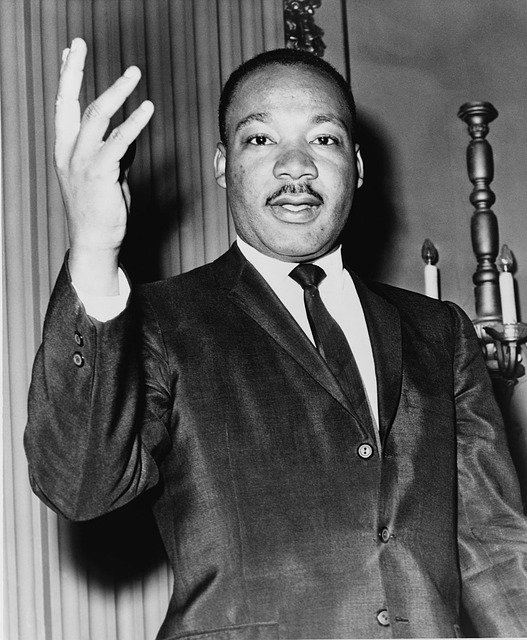I have seen some great charismatic leadership during my career as a leader and CEO. People, as well as leaders, have different personalities, and every now and then, you meet someone that uses charismatic leadership and feels almost magnetic. Charismatic leadership, in combination with genuine charisma, can definitely impact people in extraordinary ways.
This article explains charismatic leadership, its advantages, disadvantages, and how to implement it. We also give you a few examples of charismatic leaders. Before going further in-depth on this topic, let us give a quick overview.
What is Charismatic Leadership?
Charismatic leadership is when a leader uses charismatic qualities to inspire others. Charismatic leadership can be very inspirational and motivational, leading to unity and engagement. Charismatic leadership risks becoming an autocratic one-man show. Dr. Martin Luther King Jr is an example of a charismatic leader.
If you prefer video, you can watch our video right here. The article continues further below.
What is a charismatic leader?
A Charismatic leader uses communication and charisma to inspire and motivate large numbers of people to follow on a journey to fulfill a vision.
What is Charismatic Leadership?
So, what makes a good leader? You may say they have a certain charisma that attracts others. A lot of people would agree with you. Being charismatic is good, but using a charismatic leadership style can be bad or even dangerous, as we shall see.
Charismatic leadership focuses on influencing and inspiring others. Charismatic leadership is tightly connected with the persona and charisma of the leader. It is more personality bound than any of the other leadership styles. The charismatic leader often connects to his or her personal view on morals and passion. The charismatic leader also plays on the emotions of his or her followers, who, in turn, recognize and appreciate the morals and passion of their leader. Where does the line between charisma and leadership skills go?

Characteristics of a Charismatic Leader
Charismatic leaders feel very different. They shine bright when standing in the crowd and have a certain effect on the people surrounding them. Charismatic leaders are simply good at influencing other people.
The following qualities are examples of what sets charismatic leaders apart from others:
Emotional sensitivity and control
You may notice that a lot of charismatic leaders are capable of understanding others’ emotions well. After all, how will you “charm” your followers if you do not understand their situations and their needs? Charismatic leaders also tend to exhibit their own emotions in a good way. They can exercise better control over their emotions whenever needed.
Here is our Youtube video on Emotional Intelligence; it is less than four minutes and packed with information:
Presence
Charismatic leaders are known for their healthy confidence and self-confidence. You will find them communicating while maintaining eye contact with the other person. This not only reflects their confidence but also makes others value their beliefs and opinions.
This doesn’t mean that they are not great listeners. A charismatic leader will hear your opinions and exhibit great listening skills – bridging the previous bullet on emotions and the next on communication.
Effective communicators
It goes without saying that charismatic leaders are great communicators. They are confident while speaking and possess excellent listening skills. All these qualities make the charismatic leader an expert in connecting with high numbers of people. These leaders master the art of putting the right words together to convey their message. Refer to our 17 tips on leadership communication.
Determination
Charismatic leaders are highly determined. They do not give up even when facing difficult struggles and challenges. They go ahead and meet the challenge head-on instead of running away from it, even when this means taking personal risks.
Vision with a desire to make others believe
Passion, conviction, and belief can build a lot of energy, charisma, and rapport. Having the same vision, or even the more potent word, cause, can be a great glue between a charismatic leader and his or her followers. To spread goals and passion, the charismatic leader needs to be able to form a great vision for people to follow. A great charismatic leader also has a high belief in the followers and their ability to reach the goals of the group. Check out our comparison article on Charismatic leadership vs. Visionary leadership if you are interested.
If you want to improve your charisma please read more here: How to improve your charisma as a leader, where we expand on Emotional Intelligence and a few other areas you can develop for improved charisma.
Pros and Cons of Charismatic Leadership
As with anything, charismatic leadership has its own set of advantages and disadvantages. Although leaders using a charismatic style often act as a catalyst for change, they might not be the right fit for organizations that are based on rigid structures and processes.
Advantages of Charismatic Leadership
The advantages of Charismatic Leadership are:
- Charismatic leadership inspires people to work together and unitedly for a common cause
- Organizations led by a charismatic leader often show high levels of commitment and purpose
- Companies led by charismatic leaders often have high levels of clarity for the employees when it comes to roles and organizational objectives
- Being part of something “bigger” than yourself can accelerate productivity and engagement among the members
Disadvantages of Charismatic Leadership
Here is a list of the disadvantages of Charismatic Leadership:
- The organization can be too closely associated or locked together with the leader’s persona. This makes succession difficult or even impossible.
- Charismatic leaders can overestimate themselves and their own importance. They can even end up believing that they are above everything else. This could result in violating the law, moral codes, or simply not listening to anyone else.
- If the vision or “cause” is a bad one, it can lead to the demise of the organization
- A high level of obedience limits transparency and inspiration – people might simply agree to whatever the charismatic leader says. This can be risky.
Check out other styles for inspiration here, leadership styles, or keep reading on how to improve your charisma.
My experience with charismatic leadership
I don’t believe I have ever come across a leader who has truly been a representative of the charismatic leadership style. The industries I have been involved in have rarely contained any big “cause”, crisis, or anything like that. Neither has spiritual leadership been common. I think that true charismatic leaders might want to seek situations and organizations where more revolutionary change is possible, but that´s just my theory.
Even if I haven’t met a pure charismatic leader fully using the charismatic leadership style, I have met leaders that have been more or less charismatic, that’s for sure. Looking back at some of these people and my interaction with them, I strongly believe that charisma is of great importance to a leader. A total lack of charisma often affects communication negatively, just as trust, and inspiration would take hits. Being charismatic often makes people feel comfortable, safe and important – all good things that a leader would wish for his or her followers. (Check out our article on Improving Leadership Communication.)
If you are a charismatic person, there is simply a higher chance that people will remember you and what you had to say. Again, important things for a leader. So even if you think that charismatic leadership is not for you, be sure to not underestimate the importance of charisma. Being charismatic will enable you to become a better leader, leader regardless of which leadership styles you deploy and implement.
Charismatic Leadership Theory: Two schools of thought, Weber and House
Texts on charismatic leadership mostly refer to two different schools of thought, namely the texts of Max Weber and Robert House, respectively.
Max Weber’s definition of charismatic leadership
Max Weber created a definition of three leadership styles: charismatic, traditional, and bureaucratic leadership, with the concept of every leader using all three styles, but to a different proportion. The charismatic style was depending on the persona and personality of the leader to a very high extent. This person would be perceived as extraordinarily gifted by the followers. Furthermore, the authority and legitimacy of the charismatic leader depended on the followers or the “believers”. If the leader does not continue to prove worthy and of use, the legitimacy of the leader can go away, i.e. the followers are not following anymore. According to this definition, it is extremely difficult to arrange proper succession planning for a charismatic leader.
Robert J House’s definition of charismatic leadership
Robert J House defines charismatic leadership a bit differently in his “A 1976 Theory of Charismatic Leadership”. (House also launched Path-Goal Theory.) This paper reviewed both traditional literature as well as psychology literature on the topic of charisma. House defines Charismatic Leadership through defining the term “charismatic leader” as a person who has one or more of the below effects “on followers to an unusually high degree”:
- Trust in either the similarity between the beliefs of the follower and the leader and/or the correctness of the beliefs of the leader
- Acceptance of the leader without questioning
- Affection and/or willingness to obey the leader
- Identifying with as well as emulating the leader
- Emotional involvement in the activities or mission set out by the leader
- Increased goals and the feeling of being able to accomplish those goals
This is a shortened list, and some of these aspects are not extreme on their own, so I assume the power is really in the phrasing of the above having effects “to an unusually high degree”. Instead of a belief in a “gift” as outlined by Weber, House breaks this down to the personal characteristics and behavior of the leader combined with the characteristics of the followers and situational factors. The personal characteristics of the leader would be extreme self-confidence, dominance, and a conviction in the moral righteousness of the leader’s beliefs. So, where Weber focuses a lot on the personality and persona of the charismatic leader, House adds situational aspects and the characteristics of the followers to the mix, making charismatic leadership a bit more possible to understand and to undertake as a leadership style. Just like Weber, House places emphasis on conviction and beliefs.
Examples of Charismatic Leadership
Charismatic leaders exist in business settings, religious institutions, political movements, and many other parts of society. Let us look at some leaders who are known for their charisma and fit well to the charismatic leadership style explained above.
Martin Luther King Jr.
Dr. King was born in 1929 and soon started following in the footsteps of his father, who was a Baptist minister. Dr. King embarked on a civil rights career and led the bus boycott the night that Rosa Parks was arrested.
His powerful speeches and peaceful protests, coupled with his cause, made him very popular. Martin Luther King’s speeches were, in fact, so powerful that they ignited the movement for equal rights. One famous speech that he delivered on August 28, 1963, attracted more than 200,000 people.
Dr. King played a crucial role in the enactment of the Civil Rights Act in the United States a year after he delivered his speech. Perhaps could Dr. King’s way of leading, in combination with his message also make him a spiritual leader?

Sir Winston Churchill
The prime minister of the United Kingdom during World War II, Sir Winston Churchill, was born in 1874. He worked as a war correspondent in World War I, which polished his communication skills. History remembers him for his powerful orating skills that would inspire the listener. He is often quoted and is well known for several sentences that gathered millions of people. Winston Churchill is also known to be an example of a bureaucratic leader. I guess well-known and famous people that did great deeds can encompass several different styles or aspects, all depending on how you look at them. Churchill is also known as a bureaucratic leader.
Jack Welch
Next on the list of charismatic leaders is Jack Welch, who was born in 1935. Jack Welch joined General Electric as a chemical engineer in 1960 and became the youngest CEO in GE’s history in 1981. Born in Peabody, Massachusetts, Jack used to play varied sports during his childhood. He later applied the lessons learned during sports to his life.
Jack Welch is known for setting big goals and being a good and confident communicator. Mr. Welsh was sometimes referred to as the “manager of the century”, that´s how big his impact was. He was well known for a high focus on developing relationships with employees as well as customers. (For pointers on developing relationships with your team, check out affiliative leadership.)
Charles Manson
Charles Manson led a cult in California, USA, during the late ’60s. You can read more about him and the potential evil sides of charismatic leadership in our article on the dark side of charismatic leadership.
Further Reading
Refer to our other articles related to charismatic leadership for additional information:
- The dark side of charismatic leadership
- How to become a more charismatic leader
- Comparison articles: Charismatic vs. transactional leadership, Charismatic vs. transformational leadership, charismatic vs. servant leadership, charismatic vs. visionary leadership.
References
https://www.psychologytoday.com/sg/blog/cutting-edge-leadership/201210/what-is-charisma-and-charismatic-leadership
https://hbr.org/2016/11/when-charismatic-leadership-goes-too-far
https://online.stu.edu/articles/education/what-is-charismatic-leadership.aspx
https://hbr.org/2008/02/becoming-a-charismatic-leader
https://www.bbc.com/news/world-us-canada-42051402
Robert J House, “A 1976 Theory of Charismatic Leadership”: https://files.eric.ed.gov/fulltext/ED133827.pdf




